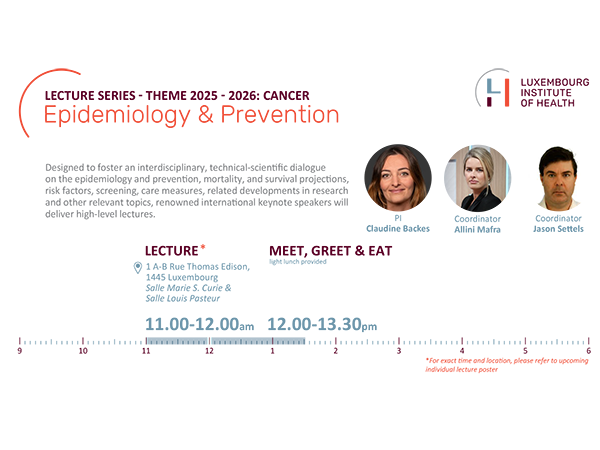- Forschungsspektrum
- Translationale Forschung
- Transversale Translationale Medizin (TTM)
- Operationszentrum für Translationale Medizin (TMOH)
- Büro für Klinisches Projektmanagement (CPMO)
- Zentrum für Klinische und Epidemiologische Untersuchungen (CIEC)
- Luxemburger Zentrum für Klinische und Translationale Forschung (LCTR)
- Integrierte Biobank von Luxemburg (IBBL)
- Disease Modeling & Screening Platform (DMSP)
- Luxgen Genom Zentrum
- Plattform für Forschungspathologie (RPP)
- Forschungsprojekte und klinische Studien
- Unterstützen Sie uns
- Translationale Forschung
🇬🇧 The TOPAS project: exploiting the tumor proteome activity status for future cancer therapies
08/11/2024 11:00 an 14:00
- Lecture Series Infection & Immunity
Bitte beachten Sie, dass der Inhalt nur auf Englisch verfügbar ist.
Speakers

Prof. Bernhard
Küster
Küster
Full Professor and Chair of Proteomics and Bioanalytics, TUM München
Director Bavarian Biomolecular Mass Spectrometry Center Co-director Center for Infection Prevention
Adjunct Professor, University of Southern Denmark, Odense
Abstract
It is important to realize that cancer is not primarily a genetic but a disease of malfunctioning signalling pathways that are regulated by the proteome. It is also important to know that the molecular “wiring” of these pathways is very heterogeneous, context dependent and differs a lot between individual patients. It is therefore of paramount importance to understand the tumor biology of a particular patient to identify therapeutically actionable mechanisms.
It is sometimes forgotten that most therapeutic drugs act on proteins and that any of the drugs known today rarely only have one effect on an organism. Yet, it has been known since the days of Paracelsus that drugs exert their effects in a dose-dependent fashion. The molecular processes leading to a drug-induced change in cellular phenotype can be roughly
divided into: i) target binding, ii) pathway engagement, and iii) cellular reprogramming to arrive at a new viable state or cell death, together forming the mechanism of action (MoA) of a drug.
Today, quantitative mass spectrometry is the most comprehensive approach for the proteome-wide characterization of patient tumors as well as drugs because of its unique ability to assay thousands of proteins and their post-translational modifications in complex cellular backgrounds in parallel. In this presentation, I will introduce our approach to profiling the (phospho)proteomes of cancer patients and how we derive information regarding the likely molecular drivers of individual disease. I will also describe the decryptT, decryptM and decryptE technologies that measure target deconvolution, pathway engagement and cellular reprogramming in a fully dose-dependent fashion respectively.
Finally, I will show how we aim to bring the two aspects together in order to arrive at individual treatment recommendations in molecular tumor boards. Beyond the clinical potential of drug and patient proteomics, it is important to share data with the scientific community so that more hypothesis may be formed and tested than any single laboratory can hope to accomplish. Our approach to this is ProteomicsDB that contains millions of dose-response curves and for >150 cancer drugs and the (phospho)proteomes of hundreds of cancer cell lines.
Responsible Scientist
Gunnar
Dittmar
Dittmar
*Please note that registration is mandatory by sending an email to carole.weis@lih.lu or michelle.roderes@lih.lu.
LOCATION
House of BioHealth
Conference Room (ground floor 0)
29, rue Henri Koch, L-4354 Esch-sur-Alzette
LECTURE: 11:00am – 12:00pm
MEET & EAT
12:30pm – 2:00pm
House of BioHealth
Salle Françoise Barré Sinoussi
29, rue Henri Koch, L-4354 Esch-sur-Alzette
Light lunch provided – Registration mandatory*
Supported by:

FORSCHUNGSABTEILUNGEN
Die Aktivitäten des LIH sind um drei zentrale Forschungsabteilungen herum organisiert, dem Department of Cancer Research (DOCR), dem Department of Infection and Immunity (DII) und dem Department of Precision Health (DoPH), mit ihren zahlreichen angegliederten Forschungsgruppen und technologischen Plattformen, in denen über 200 Wissenschaftler mit komplementärem Fachwissen in Zell- und Molekularbiologie, Bioinformatik, Statistik, klinischer Forschung und Epidemiologie beschäftigt sind.








